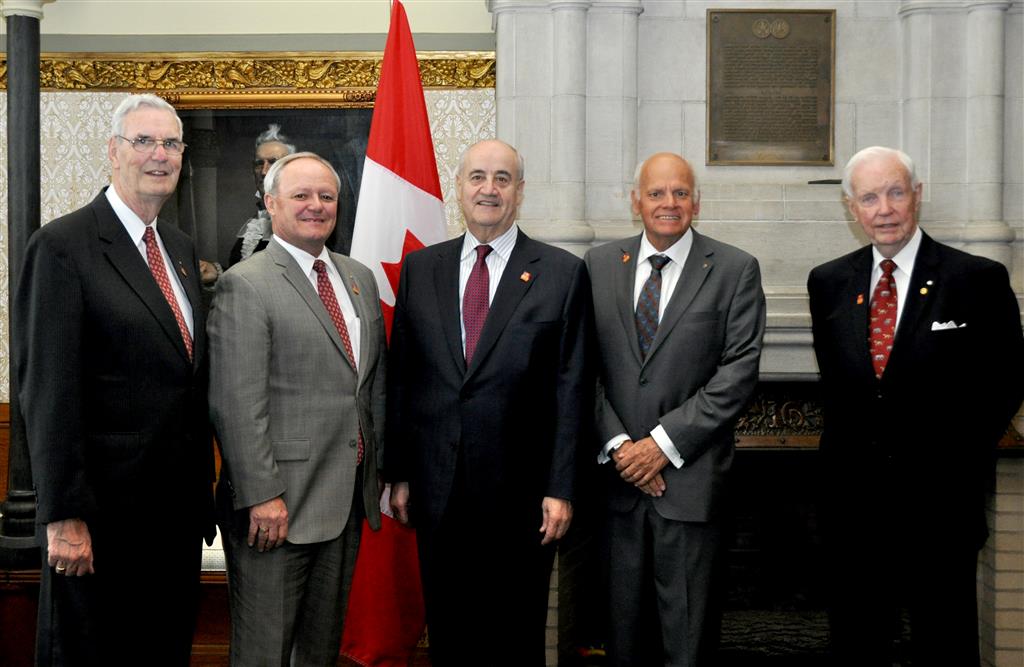Canada Remains Global Leader in Polio Eradication

 Harper Government increases support to global immunization and child health
Harper Government increases support to global immunization and child health
ABU DHABI, UNITED ARAB EMIRATES-- (April 25, 2013) - Canada will continue to be a world leader in the global push to eradicate polio and to save lives through immunization, announced the Honourable Julian Fantino, Minister of International Cooperation, during the Global Vaccine Summit, held in Abu Dhabi. Canada will increase its support for polio immunization by providing additional support to the Global Polio Eradication Initiative to address both immediate and longer-term needs to reach polio eradication by 2018.
"Canada remains a world leader in supporting immunization and is committed to joining the final global push to eradicate polio once and for all," said Minister Fantino. "By helping to eradicate polio, Canada will help children and their families lead healthy and productive lives, reducing poverty worldwide."
Canada played a leading role in the summit, hosted by His Highness General Sheikh Mohammed bin Zayed bin Sultan Al Nahyan, Crown Prince of Abu Dhabi; Bill Gates, co-chair of the Bill & Melinda Gates Foundation; and United Nations Secretary-General Ban Ki-moon. The summit brought together international organizations, non-governmental organizations, and other high-level stakeholders, including heads of state and private sector representatives, to support global commitments to immunization, starting with polio eradication. Participants are discussed the critical links between ending polio, strengthening routine immunization, and improving overall child health.
"Canada has been a long-time leader in achieving a polio-free world and making sure children get the vaccines they need no matter where they live. The impact of its leadership is a powerful example of foreign assistance that works," said Bill Gates., co-chair of the Bill & Melinda Gates Foundation. "Canada's increased support over the next six years will help ensure we can end polio and build the infrastructure needed to help all children live healthy and productive lives."
"WHO deeply appreciates this substantial contribution from the Canadian government, which will help us finish the job of polio eradication. Polio eradication will be a perpetual gift to all future generations of children the world over. Canada's generosity is a contribution to this gift," said Dr. Margaret Chan, Director General of the World Health Organization.
"While success is in our sights, there remain challenges to getting vaccinations to those who need them," said Minister Fantino. "Canada calls on religious, government, and community leadership at home and where these diseases plague our children to clearly denounce attacks on immunization workers and to continue promoting science-based information about this important work."
Economic Action Plan 2013 reaffirms Canada's commitment to international development, including immunization. As announced in Economic Action Plan 2013, the new Department of Foreign Affairs, Trade and Development will ensure greater efficiencies and effectiveness in its delivery of international development assistance while maintaining the mandate of poverty alleviation and humanitarian assistance.
"Immunization saves the lives of millions of children every year, and is one of the most cost-effective health investments," said Minister Fantino. "Through Canada's Muskoka Initiative and our commitment to child health, Canada has helped rally global support to immunize 80 percent of children, and we are working together to ensure we reach every last child."
The Global Vaccine Summit took place during the second annual World Immunization Week, which is recognized by the World Health Organization and aims to promote the use of vaccines to immunize people of all ages against diseases. For more information, please visit CIDA's page on immunization.
Backgrounder
Today at the Global Vaccine Summit, Minister Fantino announced that the Government of Canada will allocate $250 million between 2013 and 2018 to support the global goal of eradicating polio. This commitment will advance Canada's development priority of securing the future of children and youth and improving maternal, newborn, and child health, and includes an opportunity for Canadian engagement in polio eradication. This amount represents a 41-percent increase compared to the average amount contributed per year to polio since 2006. This $250 million will support the Global Polio Eradication Initiative to implement strategies and programs to eradicate polio and strengthen health systems, particularly in the three countries where polio remains a persistent problem: Afghanistan, Nigeria, and Pakistan. It will also support efforts to ensure the supply of quality immunizations and work toward innovative technologies to sustain immunization programs, including support for disease surveillance and response systems.
Today's announcement includes the following polio initiatives:
- Additional immunization activities through the World Health Organization will address current immunization coverage gaps in high-risk and endemic areas under the 2012-2013 Emergency Plan. These activities include tailored approaches for mass-immunization campaigns targeted at children under the age of five. The project will address current gaps in immunization coverage in high-risk and endemic areas by supporting supplementary immunization activities. The plan focuses action to stop polio virus transmission and to respond rapidly to any new outbreaks in high-risk areas. ($18 million)
- There will be a first contribution to the Global Polio Eradication Initiative's 2013-2018 Polio Eradication and Endgame Strategic Plan through the World Health Organization. This funding will provide first-year support for the rapid implementation of the plan, which is a comprehensive road map toward the goal of completely eradicating polio. The plan has been developed in response to the call for eradication and in coordination with national health authorities, scientific experts, and other stakeholders, including donors. The 2013-2018 Polio Eradication and Endgame Strategic Plan will build upon the progress of the 2012-2013 Emergency Plan and will focus on such activities as increasing the capacity of national governments to respond to polio virus outbreaks; strengthening monitoring and surveillance systems, particularly in the three endemic countries; and strengthening the delivery of vaccines to children under the age of five in endemic and high-risk areas. ($20 million)
- The Polio Eradication Program in Nigeria, through the World Health Organization, will respond to specific gaps identified by the World Health Organization. CIDA's investment will support the disease surveillance and response system, increase targeted polio vaccination campaigns, and strengthen the routine immunization system. The project will support the Integrated Disease Surveillance and Response System, which is the national body responsible for coordinating polio surveillance in Nigeria. Surveillance is essential in order to take appropriate public health action in the case of a communicable disease outbreak such as polio. ($18 million, 2013-2015)
POLIO RESULTS
Since 1988, Canada and its partners have supported the immunization of hundreds of millions of children, which has led to the eradication of the polio virus from almost every country on earth, and continues to put an end to this disease in the few vulnerable pockets where it remains. Canada has helped to contribute to the following results:
Global Polio Eradication Initiative
The Global Polio Eradication Initiative was launched in 1988 by national governments, the World Health Organization, Rotary International, the United States Centers for Disease Control and Prevention, and UNICEF. At that time, polio was endemic in more than 125 countries on five continents and paralyzed more than one thousand children each day. Since then, at least 2.5 billion children throughout the world have been immunized against the disease. The number of cases has declined by over 99 percent, from an estimated 350,000 cases in 1988 to 233 in 2012.
Afghanistan and polio
Since 2006, CIDA has worked with the Government of Afghanistan and other international partners, including the World Health Organization and UNICEF, to support polio eradication efforts in Afghanistan. Despite security challenges, Afghanistan has seen small but substantial progress that has resulted in:
- the ongoing vaccination of more than seven million children against polio throughout Afghanistan;
- a coordinated approach to polio prevention between Afghanistan and Pakistan through the establishment of immunization sites at main border crossings and the synchronization of immunization calendars between the two countries; and
- the successful piloting and introduction of the bivalent oral polio vaccine in Afghanistan (against Type 1 and Type 3 wild poliovirus). In combination with previously-used vaccines, the bivalent vaccine has accelerated the interruption of remaining chains of polio transmission.
Nigeria and polio
Through two complimentary initiatives with the World Health Organization and UNICEF, Canada achieved the following results in Nigeria between 2005 and 2010:
- in each of the eight high-risk states, one of the projects recruited and trained more than 4,000 community-level polio workers;
- through community dialogue activities, an increased ownership and participation of communities in polio immunization led to a 50-percent reduction in the number of children never reached by polio campaigns in northern states; and
- the proportion of children not immunized in Nigeria's highest-risk states fell below 5 percent for the first time.
Pakistan and polio
Through support to the World Health Organization (2007-2008) for eradication efforts nationwide and to UNICEF (2008-2009) for specifically targeting the polio campaign in Balochistan province, Canada has helped to:
- improve the quality and delivery of primary health care, especially for the female population, to increase access to health services by the poor, and to ultimately interrupt transmission of the polio virus in Pakistan, contributing to the global eradication effort;
- enhance the surveillance of cross-border and tribal areas and mobile populations;
- enhance technical support for data management and supervision which allowed for better tracking of the number of cases, number of children immunized, and transmission zones; and
- immunize two million children in Balochistan province.
Details of all allocations will be made at a later date.